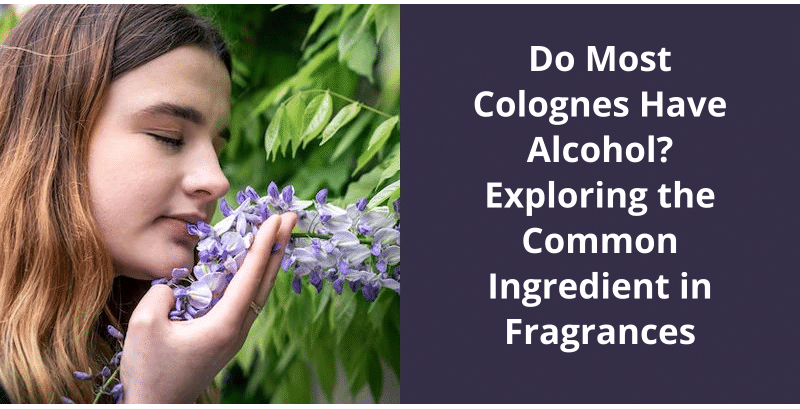Yes, most colognes do have alcohol. Alcohol is a common ingredient in many fragrances, including colognes. It is primarily used as a solvent, which means it helps in blending all the other ingredients together. Additionally, its high volatility makes it perfect for carrying the scent onto your skin and into the air. Therefore, when you spray cologne on your skin or clothes, it’s the alcohol that helps disperse the fragrance. However, there are some alcohol-free colognes available in the market, especially for people with sensitive skin or allergies.

Does Cologne Use Alcohol?
In the case of cologne, alcohol plays a vital role in it’s formulation as it helps to dissolve and blend together the various aromatic compounds and essential oils that make up the fragrance. Without it, the fragrance would be almost impossible to apply and wouldn’t last long on the skin.
This makes it ideal for use in hotter climates where heavier fragrances may be too overpowering.
It’s worth noting, however, that some people may be sensitive to the high alcohol content found in alcoholic fragrances, particularly those with dry or sensitive skin. In these cases, it may be advisable to choose a cologne with a lower alcohol content or to apply a moisturizer to the skin before using the fragrance.
In recent years, there’s been growing concern over the potential harmful effects of alcohol on the skin. While it’s true that excessive exposure to alcohol can cause dryness and irritation, the levels found in most perfumes and colognes are generally considered safe when used in moderation.
However, care should be taken when using alcoholic fragrances to ensure they’re appropriate for individual skin types and are used in moderation.
When it comes to Gucci cologne, many people often wonder if it contains alcohol. This is a common concern as people may be sensitive to alcohol or prefer products that don’t contain it. It’s important to understand that almost all perfumes, including Gucci cologne, contain alcohol as it’s a crucial ingredient in the manufacturing process. However, the level of alcohol in the fragrance can vary depending on the type of perfume.
Does Gucci Cologne Have Alcohol?
Gucci is a renowned fashion brand that’s been creating designer fragrances for decades. While many of us might wonder if Gucci cologne contains alcohol, the answer is a resounding yes.
In fact, alcohol is a crucial component in the formulation of most fragrances, and it helps to improve the overall performance of the scent. It also acts as a preservative, which helps to prolong the shelf life of the perfume.
When it comes to alcohol content, the concentration of alcohol in Gucci fragrances can vary. For instance, Eau de Toilette contains a higher concentration of alcohol when compared to Eau de Parfum or Eau de Cologne. This is because Eau de Toilette is the lightest and most diluted of all perfume types.
Alcohol is also responsible for the evaporation of the perfume.
The Effects of Alcohol on the Skin When Wearing Fragrances Containing Alcohol.
Research suggests that wearing fragrances containing alcohol may worsen skin dryness and irritation. This is because alcohol can strip the skin’s natural oils and disrupt it’s protective barrier, making it more vulnerable to environmental stressors and dehydration. Additionally, alcohol may increase the risk of certain skin conditions, such as rosacea and eczema. It’s important to always read ingredient labels and consider using alternative fragrance options that are free from alcohol.
However, many people prefer alcohol-based perfumes for their longevity, versatility, and ability to enhance the fragrance of essential oils.
What Are the Benefits of Alcohol-Based Perfume?
There are other options available, such as oil-based perfume and solid perfume, but alcohol-based perfume has some unique benefits. One of the main advantages is that it’s long-lasting. Alcohol evaporates quickly, which means that the scent particles are dispersed quickly and effectively. This allows the fragrance to last for several hours before it starts to wear off. This is especially important for people who lead busy lifestyles and don’t have the time or patience to reapply their perfume throughout the day.
Some people may be concerned about the potential risks associated with alcohol-based perfumes, such as skin irritation or drying out of the skin. While it’s true that alcohol can be a harsh drying agent, modern alcohol-based perfumes contain ingredients that help to counteract this effect. Many contain soothing agents, such as glycerin or aloe vera, which help to moisturize and nourish the skin.
It’s been used for centuries as a way to seduce and allure, and has been associated with luxury and opulence.
So go ahead and indulge in the luxury and allure of alcohol-based perfume – you won’t be disappointed!
A Comparison of Alcohol-Based Perfume to Other Types of Fragrance Products (Such as Oil-Based or Solid Perfume)
In this topic, we will be discussing the differences between alcohol-based perfume and other types of fragrance products like oil-based or solid perfume.
Now that we understand the basics of alcohol-free perfume, let’s explore the aroma and therapeutic benefits that come with using them.
What Does Alcohol-Free Perfume Means?
Alcohol-free perfumes are made using natural and organic ingredients, which not only make the scent longer-lasting but also have therapeutic qualities. The use of essential oils in the formulation of perfumes has become increasingly popular due to their natural scent and healing properties. Essential oils have been used for centuries for their medicinal benefits, such as reducing stress and anxiety and promoting relaxation.
Another benefit of alcohol-free perfumes is their eco-friendliness. Alcohol is a volatile organic compound (VOC) that contributes to air pollution and the greenhouse effect.
Some alcohol-free perfumes may have a floral scent, while others have a woody or oriental fragrance.
Different Types of Natural and Organic Ingredients Used in Alcohol-Free Perfumes
- Lavender oil
- Sandalwood oil
- Patchouli oil
- Vanilla extract
- Jasmine oil
- Ylang ylang oil
- Rose oil
- Bergamot oil
- Neroli oil
- Chamomile oil
- Geranium oil
- Lemon oil
- Peppermint oil
- Cedarwood oil
- Frankincense oil
While discussing perfumes, one often wonders about the impact of alcohol on their scent. Similarly, many people ponder if alcohol usage can enhance or diminish perfume’s strength. Therefore, it’s essential to understand the role that alcohol plays in creating a perfume’s scent and how it influences it’s strength.
Does Alcohol Make Cologne Stronger?
Many people are often curious about whether or not alcohol makes cologne stronger. The simple answer is yes, it does. Alcohol is a common ingredient found in many colognes as it acts as a solvent for the other fragrant ingredients. Without alcohol, the fragrance wouldn’t be able to be sprayed or spread evenly across the skin.
On the other hand, oil-based perfumes don’t contain alcohol, but rather other carrier oils that help the fragrance to last longer on the skin. These perfumes will have a more accurate scent that will develop more fully over time and evolve like a flower. The oil acts as a kind of protective shield on the skin, holding the fragrance and allowing it to unfold slowly and steadily.
Despite the differences between alcohol-based and oil-based fragrances, both types are equally popular and effective. It all comes down to personal preference and the kind of fragrance experience that you’re looking for. Some people prefer the powerful and immediate impact of an alcohol-based cologne, while others appreciate the gradual and subtle unfolding of an oil-based perfume.
Some may contain more than others, depending on the concentration of the other fragrant ingredients.
Perfumers must carefully balance the concentration of alcohol with other elements to create a scent that’s both powerful and nuanced.
When it comes to creating your own signature fragrance, the choice of carrier can make a big difference in the way the scent wears on your skin. While oils can provide a more subtle and natural fragrance, alcohol is best for those who want a more intense, long-lasting fragrance. Let’s take a closer look at why choosing the right carrier for your fragrance is so important.
Should I Put Alcohol in My Cologne?
Ultimately, it comes down to personal preference and the desired effect you want to achieve. If you prefer a subtle scent that stays close to your body, then using oils as a carrier might be the best option for you. They’re also great for people with sensitive skin, as alcohol can be drying and irritating.
However, if you want a more powerful fragrance that lasts longer, using alcohol as a carrier can be beneficial. Alcohol evaporates quickly, leaving the scent behind, and also helps to preserve the ingredients in your cologne. Perfumers alcohol is the most commonly used type of alcohol in fragrance making as it’s 190 proof, meaning it’s a high concentration of alcohol, enough to dilute and preserve most fragrance blends.
Some fragrance enthusiasts argue that using fractionated coconut oil, which is less oily and greasy than regular coconut oil, can provide a happy medium between the two carriers. It still holds onto the fragrance for longer than alcohol can, while also being more subtle and less irritating to the skin.
It’s also important to consider the ingredients in your cologne when choosing a carrier. Some materials, such as citrus oils, can become phototoxic when exposed to sunlight and can cause skin sensitivity. If using alcohol as a carrier, the cologne will also have an alcohol odor when it’s first applied, which might not be desirable to everyone.
It’s best to experiment with both options and see which one works best for you. It’s also important to remember that a higher concentration of fragrance oils doesn’t necessarily mean a better scent.
Source: What type of alcohol goes into perfume?..
Conclusion
While the specific ratios of perfume oil, alcohol, and water may vary depending on the type of fragrance, it’s important to understand the role of alcohol in achieving the desired aroma and the impact it may have on the skin. When choosing a cologne, it’s essential to consider factors such as alcohol content, sensitivity to fragrance, and personal preferences.





